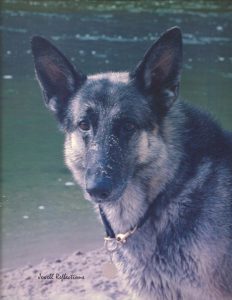
BY FRAN JEWELL

Quite honestly, dog “pack” behaviors and “social rank” have become a politically incorrect topic to even discuss. There are many people who believe that dogs are no longer “pack animals” because of domestication. Dogs do understand “social rank.” All mammals understand social rank, meaning that there are those higher in social rank than others.
Our human gut reaction is to discredit social rank because we want our dogs to be equals or more humanlike. We treat them just like we treat our children, even going so far as to call them “fur babies” or “fur kids.”
If we have more than one dog, they all have the same beds, same collars, and we would never consider taking one dog on a walk without the other! We treat them almost as many people treat twin babies, dressing them the same, and so on.
I was driving home from Boise one day and saw a group of turkey vultures near a deer carcass. What a disgusting thing to witness, frankly. But, one vulture was clearly going to eat the carcass by using intimidating behavior to keep the others away. This vulture was clearly higher in social rank than the other vultures. Even bird owners will admit social ranking among their domesticated birds.
Those that can accept social rank may still not understand what that means for dogs. And, unfortunately, many use the term “alpha dog” to describe and minimize aggressive behavior.
I can clearly state that there are very few true “alpha dogs.” Alpha dogs are like generals in the military—there are very few and everyone respects them automatically. Generals don’t have to fight to prove their rank; it’s clear for everyone to see by their “uniform.”
A true alpha dog can walk into a huge group of other dogs and every dog knows that dog is an alpha. Those dogs that are confused about their rank might challenge the higher-ranking dog. But the alpha dog will have little to do with them and usually diffuses the situation through very keen, skillful and very clear behaviors or “commands” to the challenger.
Not all higher-ranking dogs are alpha dogs, but they are higher ranking than others. I visualize it much like the military. Like a pyramid of ranks, most dogs are at the bottom—or the enlisted men. As you go up the pyramid of rank, there are fewer and fewer dogs in each rank, until you get to the general, or alpha dog. Dogs with good social skills will recognize the rank of another dog and respect that. If he is higher than the others, he respects that. If he is lower, he respects the higher-ranking dog.
It’s all about respect, and fighting does not always gain respect. We dog owners can teach dogs respect and foster good social skills to encourage better behaviors with each other. If you are not sure how to go about this, a good place to start is contacting a certified dog behavior consultant. I am always available to answer questions or do a consultation.
Fran Jewell is an Idaho Press Club award-winning columnist, IAABC-certified dog behavior consultant, NADOI-certified instructor #1096 and the owner of Positive Puppy Dog Training, LLC, in Sun Valley. For more information, visit positivepuppy.com or call (208) 578-1565.


